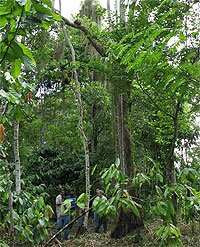 |


 |
|
||
  |
||
|
|
Seeds of Change and Conservation International Join Forces to Fight Rainforest Devastation Partnership will focus on supporting an environmentally sustainable cacao industry SANTA FE, NM/WASHINGTON, DC — Seeds of Change, a global leader in sustainable organic agriculture practices, announced today that it will partner with Conservation International (CI) on vital programs to create an environmentally sustainable cacao industry in the Brazilian Atlantic Forest where both cacao farming and biodiversity are in jeopardy. Seeds of Change and CI will work to expand and strengthen beneficial practices of traditional cacao farming that help naturally to protect and conserve forest biodiversity, while at the same time benefiting the livelihoods of cacao farmers. Forest biodiversity has gradually disappeared in recent times as farmers in the region have battled devastating plant diseases that have put farms out of business and threatened the feasibility of these more eco-friendly growing methods. The two organizations will work with local cooperatives in Southern Bahia to rebuild the use of a more sustainable system of cultivating cacao called “cabruca” in which the cacao is naturally grown under the canopy of Atlantic Forest trees that also serves as an essential secondary habitat for endangered forest fauna and flora that are disappearing with increased deforestation. The Institute for Social and Environmental Studies of Southern Bahia (IESB) and the State University of Santa Cruz (UESC) will provide valuable local support to this project. “This partnership with Conservation International is imperative to ensure and enhance the economic, social and environmental sustainability of cabruca systems,” said Mark Koide, president of Seeds of Change. “Our work will help strengthen the cooperatives of small and medium cacao producers and help the transitions from conventional to sustainable agriculture, a crucial move to preserve the rainforests and stabilize the future of the cacao industry.” Farmers will receive critically needed education to prevent and manage the effects of “witches’ broom” (Crinipellis perniciosa), a disease which has devastated cacao production and farming profits in recent years, and caused many struggling farmers to turn to more environmentally harmful businesses including logging, cattle ranching and robusta coffee growing in order to survive. Farmers will be taught how to graft the cocoa trees with more disease resistant cocoa varieties, which will allow them to resume the cabruca system of growing that is so critical to advancing the restoration of farm forests in the most ecologically sensitive areas. “The generous support of Seeds of Change will allow us to strengthen our alliances with Brazilian cacao producers in ways that both contribute to enhancing the biodiversity of the Atlantic Forest and the economic needs and interests of local farmers,” said Paulo Gustavo Prado, Environmental Policy Director of CI’s Brazil program. Work will be concentrated on farms that can contribute to CI’s ‘Corridor’ strategy which seeks to consolidate and connect established protected areas with unprotected forests to redevelop and expand essential habitats for local plant and animal species. The project will help standardize important biodiversity farming practices throughout the Bahia cacao farming community and establish the necessary guidelines for the biodiversity-friendly production of cacao. It will also promote the region’s practices on the national and international market. Small targeted research activities will be conducted to examine how these practices further contribute to biodiversity objectives and support cacao production. The Seeds of Change partnership with CI marks the company’s first global venture under its “One Percent Initiative,” a philanthropic program the company created to dedicate one percent of its annual net sales to advance the cause of sustainable organic agriculture around the world. # # # About Seeds of Change:Seeds of Change was born in 1989 with one central mission: to promote biodiversity and sustainability. We began as an organic seed company committed to reintroducing countless heirloom and traditional seed varieties back into modern society’s food supply. Our certified organic foods are a natural extension of that mission, made exclusively with organically grown vegetables and herbs, and inspired by cultures and flavors from around the globe. Visit us and our farm at www.seedsofchange.com About Conservation International: Conservation International (CI) applies innovations in science, economics, policy and community participation to protect the Earth’s richest regions of plant and animal diversity and demonstrate that human societies can live harmoniously with nature. Founded in 1987, CI works in more than 40 countries on four continents to help people find economic alternatives without harming their natural environments. For more information about CI, visit www.conservation.org About IESB: The Institute for Social and Environmental Studies in Southern Bahia (IESB) is a Brazilian NGO that conducts research, field projects, and other activities aimed at conserving the Atlantic Coastal Forest. Since its founding, IESB has been working at the interface between conservation and development, emphasizing the inclusion of local people and communities in the search for shared solutions. For more information, visit www.iesb.org.br
Conservation International’s Center for Environmental Leadership in Business (CELB) provides a new forum for collaboration between the private sector and the environmental community. Created in partnership with Conservation International (CI) and the Ford Motor Company, CELB operates as a division of CI and is governed by a distinct executive board of leaders from the business and environmental communities-engaging the private sector worldwide in creating solutions to critical global environmental problems in which industry plays a defining role. For further information about CELB, please visit celb.org. 
|
MEDIA CONTACT Katrin Olson CELB [email protected] 703-341-2768  © CI, Goetz Schroth Visit by members of the CI and The Institute for Social and Environmental Studies of Southern Bahia (IESB) team to a smallholder cocoa farm in the process of rehabilitation, including the introduction of witches' broom tolerant cocoa germplasm. |
|